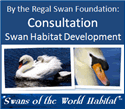Ask the Swan Specialist
Date: 26 October 2017
For Immediate Release
October 26, 2017
Contact: Shirley A. Bolin
Email: Bolin.S@att.net
Phone: (407) 931-6838
Regal Swan® Foundation Discovers United States Violating 1918 Migratory Bird Treaty Act:
Federal, State & Local Agencies Have Enforced an Unconstitutional & Illegal Law, Killing Thousands of Mute Swans Nationwide at Taxpayers’ Expense
After extensive research, The Regal Swan® Foundation, Inc., and its legal team discovered that the U.S. has been violating the 1918 Migratory Bird Treaty Act (MBTA) since 2004, using an unconstitutional and illegal law titled, “The Migratory Bird Treaty Reform Act of 2004.”
The Interior Department, U.S. Fish & Wildlife Services, and the U.S. Department of Agriculture as well as state and local wildlife agencies, individuals, private companies and special interest groups, some of whom receive government grants, have been using this bogus Reform Act to authorize and circumvent the original MBTA Treaty. By enacting this fraudulent law, hundreds of thousands of Mute Swans have been killed nationwide, using taxpayers’ money to fund this illegal killing program. “This bogus law is one of the largest frauds ever perpetuated on the American taxpayer,” explains Sheila A. Bolin, CEO, of The Regal Swan® Foundation, Inc.
Under the auspices of the Migratory Bird Treaty Reform Act of 2004, U.S. Wildlife officials and unscrupulous politicians snuck a bill through Congress under an omnibus appropriations bill thereby reforming the original Treaty and enacting it into law. This is highly unconstitutional as a Treaty is a stand-alone international law instrument, that must be amended and ratified through the Ratification Executive Committee. According to Holland vs. Missouri, 252 U.S. 416 (1920), the Supreme Court upheld the constitutionality of the MBTA. Noting that the treaties clause of the Constitution (Article VI, clause 2), sometimes known as the “supremacy clause,” once a treaty is ratified, it becomes the “Supreme law of the land.” Meaning that no federal, state or local agencies or governments may override a Treaty once it has been ratified. Thus, the MBTA of 1918 was ruled constitutional and was to be enforced by all federal, state and local agencies.
In another court case, Hill vs. Norton, 275 F.3d (D.C. Cir. 2001), the U.S. Fish and Wildlife Services was required to recognize that Mute Swans had, in fact, been protected under the original MBTA all along, as a member of the Anatidae family and migratory. The U.S. Fish and Wildlife Services, even admitted at that time, that Mute Swans were migratory.
Under the Reform Act of 2004, not only was the bill originally sent through the House of Representatives, which is highly unconstitutional, bills regarding treaties can only go through the Senate, the reform bill, which became law, was never ratified by the President, or the other four countries that belong to the Treaty, to-wit: Canada, Mexico, Japan and Russia.
Using an underhanded ploy to get the bill signed into law, the bill came out of the Environment and Public Works Committee of Congress. Under the treaty process, a bill must come from the Foreign Relations Committee in the U.S. Senate. The Reform Act bill was buried in the appropriations bill and set into law, at taxpayers’ expense. As such, the Migratory Bird Treaty Reform Act of 2004 violates the Treaty, the treaty process and international law governing treaties, contracts and agreements. Since the Reform Act was never ratified, at this moment, the Act is unlawful, unconstitutional and unenforceable. Therefore, any entity or person involved in this taxpayer funded fraud can be held both criminally and civilly liable for their participation under international law. In addition, any entity or individual may also be held civilly liable if class-action lawsuits are brought forth by taxpayers for restitution of the damage done while violating both the Treaty and international law.
Under the Obama administration, the Interior Department and U.S. Fish and Wildlife Services, with the assistance of the Department of Agriculture, began a campaign to rid the Mute Swans from across the U.S., using an arbitrary and capricious method to convince taxpayers that this swan species was detrimental to the environment. Current, reliable scientific research as well as international swan and wetland habitat specialists have disputed the misrepresentation of Mute Swans by U.S. wildlife officials. These U.S. agencies and individuals continue to cite non-existent environmental assessments. National Environmental Policy Act (NEPA), assessments mandated by a Federal Court in 2004 have never been conducted in the U.S.
These same agencies have introduced Trumpeter Swans into areas that the swans never inhabited paving the way to develop a trophy waterfowl hunting program. The entire time that the Trumpeter Swan program has been in existence, federal, state and local wildlife officials assured the taxpayers that these birds would never be hunted. Last week, federal and state officials stated that the birds should be allowed to be hunted because hunters could not distinguish between Trumpeter and Tundra swans. Tundra swans are also protected under the original Treaty.
U.S. wildlife agencies and officials have allowed and encouraged hunting across the U.S. of Tundra Swans. Additionally, the last ratification of the MBTA was in 1992 under President Bill Clinton and specifically stated that all swan species were protected, and not to be hunted except Tundra Swans. The 1992 ratification allowed Tundra Swans to only be hunted by indigenous people in Alaska. The 2004 Reform Act was enacted during President George W. Bush’s presidency. As President Bush was being lobbied to change the original MBTA Treaty to allow the killing of Mute Swans, President Bush stated that he was not going to sign this bill for ratification. Therefore, under international law, the U.S. must immediately cease and desist the killing of all swan species in the U.S. The only exception is for the hunting of Tundra Swans in Alaska by indigenous people.
The Regal Swan® Foundation, Inc. is based in Orlando, Florida. This international program provides humane treatment and veterinary medical care for swans worldwide (both captive and wild), through education, research, conservation, swan rescue and swan product development. The program has been awarded: U.S. Presidential “Point of Light,” award; Jefferson Award; Telly Award and The John Muir Conservation Award. CEO Sheila A. Bolin was recently named one of the top 30 conservationists in the world by the prestigious 2018 Indianapolis Award.
Ask the Swan Specialist is powered by
Tetra-WebBBS 5.30 Beta © 2006-2007 Tetra-Team






